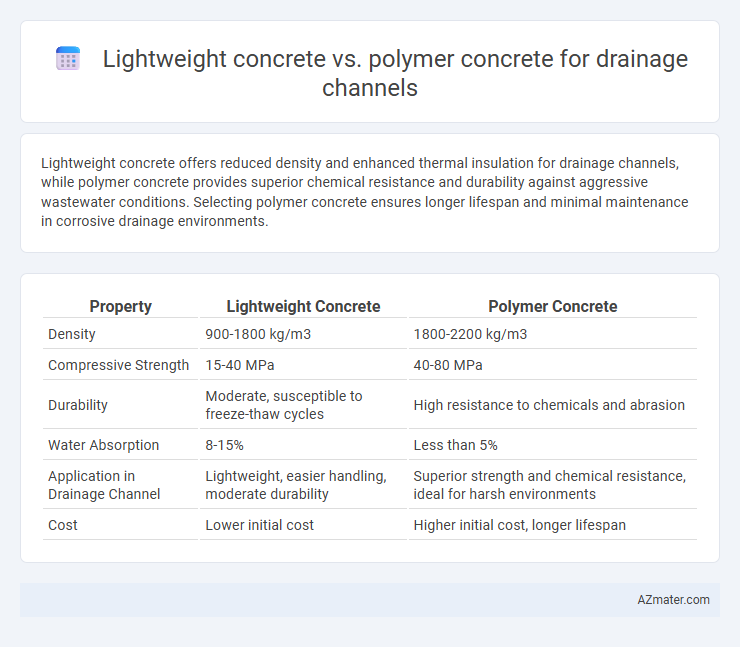Lightweight concrete offers reduced density and enhanced thermal insulation for drainage channels, while polymer concrete provides superior chemical resistance and durability against aggressive wastewater conditions. Selecting polymer concrete ensures longer lifespan and minimal maintenance in corrosive drainage environments.
Table of Comparison
| Property | Lightweight Concrete | Polymer Concrete |
|---|---|---|
| Density | 900-1800 kg/m3 | 1800-2200 kg/m3 |
| Compressive Strength | 15-40 MPa | 40-80 MPa |
| Durability | Moderate, susceptible to freeze-thaw cycles | High resistance to chemicals and abrasion |
| Water Absorption | 8-15% | Less than 5% |
| Application in Drainage Channel | Lightweight, easier handling, moderate durability | Superior strength and chemical resistance, ideal for harsh environments |
| Cost | Lower initial cost | Higher initial cost, longer lifespan |
Introduction: The Role of Concrete in Drainage Channel Construction
Concrete plays a critical role in drainage channel construction by providing durability, strength, and resistance to environmental stressors. Lightweight concrete, known for its reduced density and thermal insulation properties, offers ease of handling and reduced load on supporting structures. Polymer concrete enhances chemical resistance and impermeability, making it ideal for channels exposed to aggressive fluids and harsh conditions.
What Is Lightweight Concrete?
Lightweight concrete is a type of concrete that incorporates lightweight aggregates such as expanded clay, shale, or pumice, resulting in reduced density and improved thermal insulation, making it ideal for drainage channels requiring lower structural loads. Its porosity and lighter weight enhance ease of handling and installation while maintaining adequate strength and durability to withstand exposure to water and environmental conditions. Compared to polymer concrete, lightweight concrete offers better cost-effectiveness and environmental sustainability for large-scale drainage infrastructure projects.
What Is Polymer Concrete?
Polymer concrete is a composite material consisting of a polymer binder combined with aggregates such as sand, gravel, or crushed stone, offering superior chemical resistance and durability compared to traditional lightweight concrete. In drainage channel applications, polymer concrete provides enhanced impermeability, high strength, and excellent resistance to corrosion from harsh chemicals and environmental conditions. Unlike lightweight concrete, which prioritizes reduced weight and thermal insulation, polymer concrete excels in longevity and structural integrity, making it ideal for demanding drainage systems exposed to aggressive substances.
Key Material Properties Comparison
Lightweight concrete offers lower density and enhanced thermal insulation, making it suitable for drainage channels requiring reduced weight and moderate strength. Polymer concrete exhibits superior chemical resistance, higher compressive strength, and exceptional durability against aggressive drainage environments. The choice between lightweight and polymer concrete depends on specific requirements such as load-bearing capacity, environmental exposure, and longevity needs in drainage applications.
Strength and Durability Analysis
Lightweight concrete for drainage channels offers moderate compressive strength ranging between 15-30 MPa, providing sufficient durability for typical load conditions and excellent resistance to freeze-thaw cycles. Polymer concrete exhibits superior strength, often exceeding 70 MPa, and exceptional chemical resistance, making it highly durable against aggressive wastewater and corrosive environments. The enhanced bonding properties and lower permeability of polymer concrete contribute to its longer service life and reduced maintenance in drainage infrastructure compared to lightweight concrete.
Installation and Handling Considerations
Lightweight concrete offers easier handling and faster installation due to its reduced weight, minimizing labor costs and equipment requirements for drainage channel projects. Polymer concrete provides superior chemical resistance and durability, but it requires more careful handling and specialized installation techniques to ensure proper curing and adhesion. Both materials demand specific preparation, with lightweight concrete allowing quicker setting times while polymer concrete benefits from controlled temperature conditions during installation to optimize performance.
Cost Comparison: Lightweight vs Polymer Concrete
Lightweight concrete typically offers a lower initial cost for drainage channels due to its use of readily available aggregates and reduced weight, which lowers transportation and handling expenses. Polymer concrete, while more expensive upfront because of specialized resins and additives, provides superior durability and chemical resistance, potentially reducing long-term maintenance and replacement costs. Evaluating total lifecycle costs often reveals that polymer concrete's higher initial investment can be offset by enhanced performance in aggressive environments commonly encountered in drainage systems.
Environmental Impact and Sustainability
Lightweight concrete for drainage channels offers reduced material use and lower embodied energy, contributing to decreased CO2 emissions compared to traditional mixes. Polymer concrete, incorporating recycled resins, enhances durability and chemical resistance, extending service life and reducing maintenance frequency, which supports long-term sustainability. Both materials promote environmental benefits, but polymer concrete's superior longevity often results in a smaller overall ecological footprint for drainage infrastructure.
Common Applications and Use Cases
Lightweight concrete is frequently used in drainage channels for its reduced weight, making it ideal for applications requiring easy handling and rapid installation in residential and commercial infrastructure projects. Polymer concrete is preferred in industrial and high-chemical-exposure environments due to its superior chemical resistance and durability, commonly applied in wastewater treatment plants and heavy-duty drainage systems. Both materials enhance drainage efficiency, but selection depends on specific performance needs such as load capacity, environmental conditions, and maintenance requirements.
Choosing the Best Option for Drainage Channels
Lightweight concrete offers excellent thermal insulation and reduced dead load, making it ideal for drainage channels in areas requiring easier handling and quick installation. Polymer concrete provides superior chemical resistance, high compressive strength, and durability, making it the best choice for channels exposed to corrosive environments or heavy traffic loads. Selecting the best option depends on site-specific requirements such as load capacity, chemical exposure, and installation constraints to ensure long-term performance and cost-effectiveness.

Infographic: Lightweight concrete vs Polymer concrete for Drainage channel
 azmater.com
azmater.com